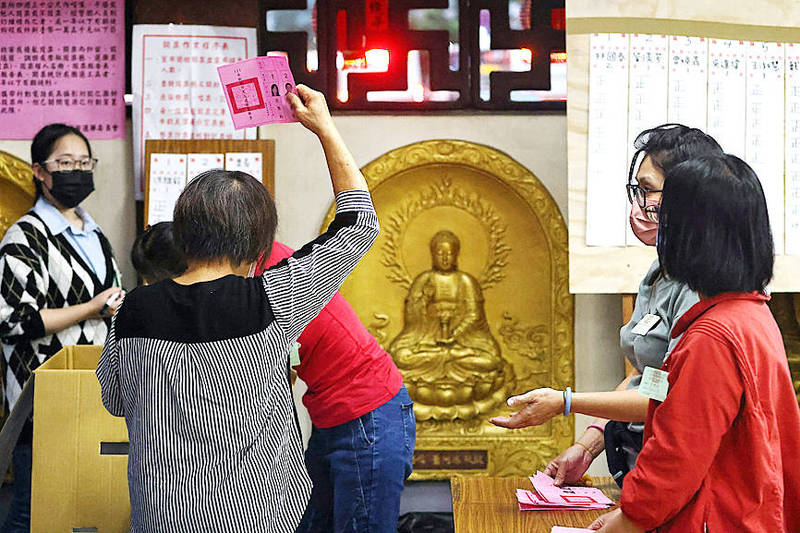《TAIPEI TIMES》 Vote ‘not likely’ to affect 2024 result

Staff count local election ballots at a temple in New Taipei City on Saturday. Photo: Ann Wang, Reuters
ANALYSIS: The local elections showed that the KMT is a competitive player, but needs to work at changing its image regarding China, experts said
/ Staff writer, with CNA
The nine-in-one local election results would bolster the Chinese Nationalist Party (KMT), but are unlikely to have a major effect on the 2024 presidential election, when cross-strait issues are back in focus, political commentators said.
In Saturday’s elections, the KMT won 13 of the 21 cities and counties up for grabs, including four of the country’s six biggest metropolitan areas, where nearly 70 percent of the population lives.
The Democratic Progressive Party (DPP) lost three of the seven cities and counties it held, although it gained Penghu County. Its poor results prompted President Tsai Ing-wen (蔡英文) to announce her resignation as party chairpersom.
Yoshiyuki Ogasawara, a professor at Tokyo University of Foreign Studies who correctly predicted that the DPP would win only five municipalities, told the Asahi Shimbun newspaper that the ruling party had chosen the wrong Taipei and Taoyuan mayoral candidates, and was unsuccessful in playing up the China issue before the election.
Ogasawara said he viewed it as a sign of the “maturity” of Taiwan’s democracy that voters are able to compartmentalize their thinking about local and national elections.
For this reason, the KMT’s win is unlikely to have a major impact on 2024, he said.
Kharis Templeman, a research fellow at US think tank the Hoover Institution, said that the KMT benefited from structural advantages in the local elections, such as the majority of cities and counties being more pro-KMT than the national average, and from having several popular incumbents on the ballot.
There might also have been “some fatigue” among the electorate regarding the DPP, particularly in terms of the candidates it put forward, he said.
While the KMT must craft a different message for its national election campaign, Saturday’s results showed that the party “has a future in Taiwan politics and [will probably] be competitive in 2024,” Templeman said.
Shelley Rigger, a professor of East Asian Politics at Davidson College in North Carolina, said that while the elections had a local focus, they showed that the KMT “has not been eliminated as a competitive player” in Taiwan’s politics, and should not be counted out in 2024.
If the KMT is to be competitive, it needs to continue working to overcome its portrayal as a “Beijing-leaning” party in the local media, she said.
“They need to finish adjusting their message to align with the mainstream Taiwanese preference for the status quo,” Rigger said.
Robert Tsao (曹興誠), founder and former chairman of contract chipmaker United Microelectronics Corp (聯電), yesterday wrote on Facebook that the local election results send a message to the world that Taiwan would compromise with and try to appease the Chinese Communist Party, “which is worrying.”
However, Wang Dan (王丹), a prominent student leader in the 1989 democracy movement in Beijing, said that the DPP’s major setback in the elections did not mean that voters were supporting the KMT or ditching the government’s “counter-Beijing” strategy.
There had been claims on the Internet prior to Saturday’s elections that voters wanted to “teach the DPP a lesson,” Wang said.
“I would say that voters should always teach any ruling party a lesson with their ballots, but I don’t think the outcome of Saturday elections means Taiwanese voters now prefer the KMT over the DPP,” Wang said.
Chen Shih-min (陳世民), an associate professor of political science at National Taiwan University, said many young voters did not vote.
This had a negative effect on the DPP’s fortunes, but the issue of Taiwan’s sovereignty, on which the DPP generally has a higher approval rating, did not play a deciding factor at the polls, which revolved around economic problems, Chen said.
Lin Tzu-li (林子立), an associate professor of political science at Tunghai University agreed, saying that voters in local elections care mostly about economic issues and their livelihoods, and COVID-19 had dealt a heavy blow to the service sector, in which a large number of people are employed.
新聞來源:TAIPEI TIMES














